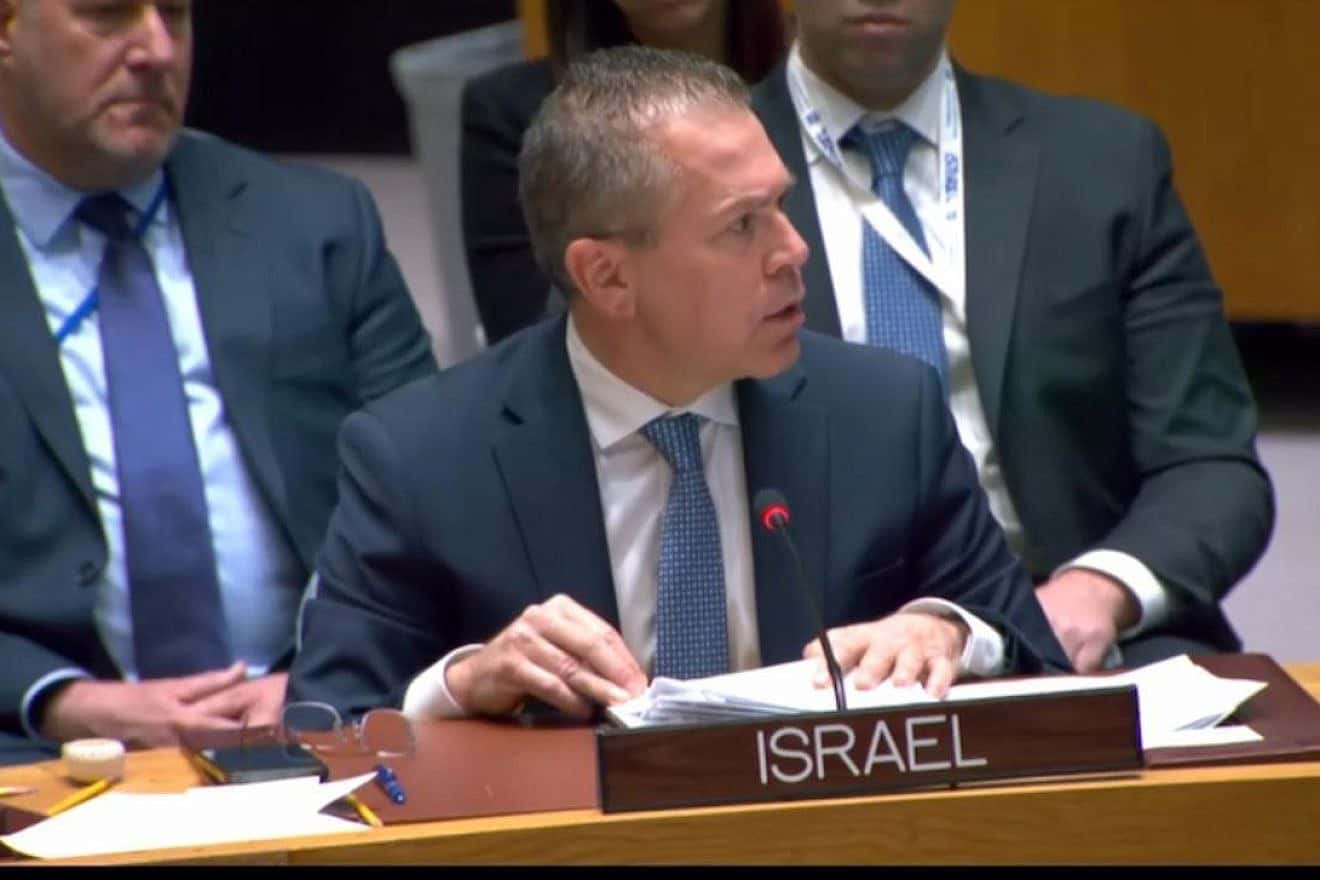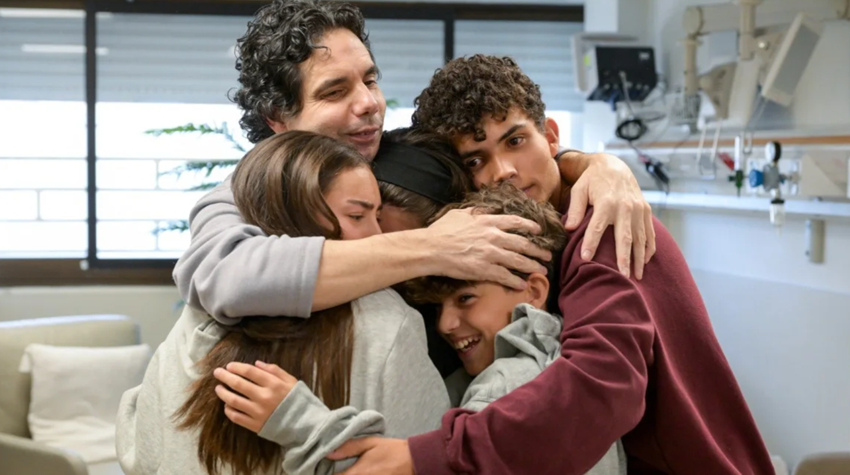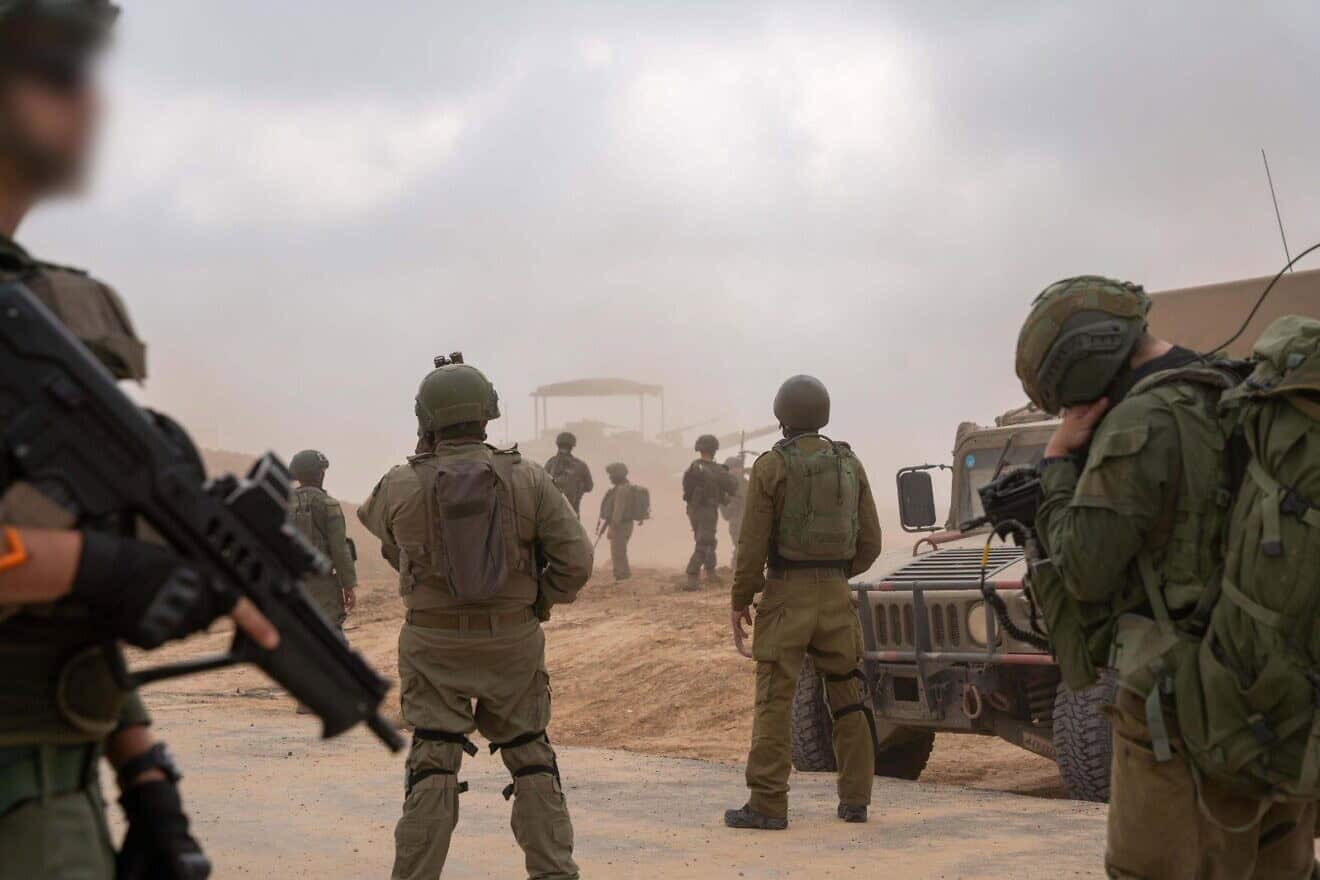Israeli Ambassador to the United Nations Gilad Erdan at a U.N. Security Council meeting that discussed the war with Hamas in the Gaza Strip, Oct. 18, 2023. Credit: Courtesy of the Israeli Mission to the United Nations.
By Mike Wagenheim
The United Nations Security Council spent Friday afternoon attempting to tackle a widening crisis in the Middle East.
With the Israel-Hamas war approaching its 100-day mark, Algeria was granted a briefing on Friday following its request for the council to meet over what it calls the threat of forced displacement of Gazans by Israel.
Later on Friday, the 15-member council discussed the escalating conflict in the Red Sea, ignited the incessant attacks on commercial vessels by Yemen’s Houthis.
Israel’s U.N. envoy chided the Security Council for its relentless focus on Israel’s effort to dismantle Hamas’ terror regime in Gaza. Addressing the body, Ambassador Gilad Erdan noted actual displacements taking place elsewhere around the world—actions that have not drawn a whisper from the council.
“As we speak, there are over one million Muslims being forcibly removed from their homes, all of their possessions taken from them as they face poverty, famine and disease. No, I am not talking about the situation in Gaza, but about Pakistan’s forced displacement of 1.3 million Afghans,” said Erdan.
He claimed that if blame for controversial actions cannot be laid at the feet of Jews, the council apparently doesn’t feel it is worthy of their time.
“Why does the forced displacement of Muslims from a Muslim country mean nothing to the Algerian representative and the council? I’ll tell you why: No Jews, no news,” said Erdan. “Over the past decade, 50,000 Christians in Nigeria have been butchered and hacked to death. Is this even a concern to the council?Again, no Jews, no news.”
While the United States’ ambassador to the United Nations criticized those Security Council members who “still cannot bring themselves” to condemn Hamas’ Oct. 7 massacre, speak of those still being held hostage in Gaza or criticize ongoing rocket attacks by Hamas and Hezbollah against Israel, she also criticized rhetoric from some Israeli ministers.
“We unequivocally reject statements by some Israeli ministers and lawmakers calling for a resettlement of Palestinians outside of Gaza,” said Linda Thomas-Greenfield, claiming such statements are irresponsible and make securing a lasting peace more difficult.
At the same time, Thomas-Greenfield questioned why some council members have “refused to hold Hamas accountable for using civilians as human shields?”
Thomas-Greenfield also called for calm in Judea and Samaria, condemning attacks by both Palestinian militants against Israeli civilians and Jewish residents against Palestinians.
Vassily Nebenzia, Russia’s ambassador to the United Nations, continued on Friday to lambaste the United States over Washington’s refusal to allow language demanding a ceasefire into Security Council resolutions.
He also claimed that Israel’s discussions regarding flooding Hamas’s terror tunnel system with seawater would “trigger a massive environmental disaster and besides, render the enclave virtually uninhabitable,” calling it potentially an act of genocide.
Nebenzia also took a shot at the International Criminal Court, which critics say has been slow to advance a prosecution of Israel under its latest prosecutor, Karm Khan of Great Britain.
Nebenzia said he did not expect Khan to “find the courage to go against his Western masters and their allies, whose political interests the ICC is serving.”
Khan’s office issued arrest warrants in March against Russian President Vladimir Putin, the Russian Commissioner for Children’s Rights Maria Lvova-Belova, alleging responsibility for the war crime of unlawful deportation and transfer of children during the Russian-Ukraine War. It marked the first warrant the ICC has ever issued against the leader of a permanent member of the U.N. Security Council.
While France, which holds the Security Council presidency this month, attacked Israel for its settlement policy, Ambassador Nicolas de Rivière did make a robust call on Friday for the immediate release of all remaining hostages held in Gaza.
“This council must condemn in the strongest terms the terrorist attacks committed by Hamas and other terrorist groups on Oct. 7, including sexual and gender-based violence used as a weapon of war,” de Rivière added, emphasizing that France will advance action to establish sanctions against Hamas at the European level.
Attention was then turned to the Houthis, whose relentless attacks on vessels in the Red Sea finally drew a significant international response on Thursday, with over 50 strikes on Houthis targets in Yemen conducted by the United States and United Kingdom, with support from Australia, Bahrain, Canada and the Netherlands.
Thomas-Greenfield told the council that the strikes, coming days after a Security Council resolution on the matter, were conducted to “disrupt and degrade” the Houthis’ “reckless attacks” in the Red Sea and in the Gulf of Aden, calling the strikes necessary, proportionate, and consistent with international law.
She also urged council members and other states with influence over Iran to help bring about a change in Tehran’s military and financial support for the Houthis’ attacks.
A number of non-permanent members said that while they agree the Houthis’ attacks are of major concern, they fear that the council’s resolution passed earlier in the week may have been interpreted as a green-light for measures taken by Washington and London, which, they said, was not the intention.
Source: JNS


































